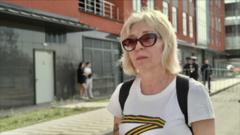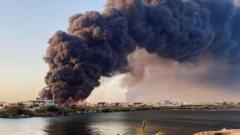A Ukrainian drone offensive has led to a significant disruption in air travel across Russia, stranding approximately 60,000 passengers as cancelled flights pile up. Russian officials report a record number of drone destructions while Ukraine rebuffs a ceasefire proposal.**
60,000 Passengers Stranded in Russia Due to Ukrainian Drone Attacks**

60,000 Passengers Stranded in Russia Due to Ukrainian Drone Attacks**
Massive disruptions at Russian airports follow an extensive drone offensive from Ukraine, as tensions rise amidst ongoing conflict.**
At least 60,000 air passengers have found themselves stranded in various Russian airports following a significant Ukrainian drone attack that has disrupted air travel across the nation. The Russian Association of Tour Operators (ATOR) reported that approximately 350 flights were affected from Tuesday evening in major cities including Moscow, St. Petersburg, and Sochi.
The Russian Defense Ministry claims that within the last 24 hours, 524 Ukrainian drones have been shot down, signaling an unprecedented level of conflict escalation if verified. Amidst this chaos, Ukraine reported that a drone and missile attack on Kyiv resulted in two fatalities, just as Russia prepared for a self-imposed three-day ceasefire intended to coincide with the upcoming 9 May World War II victory parade in Moscow.
Ukraine has firmly dismissed Russia's ceasefire proposal, labeling it a "theatrical play" while advocating for an unconditional 30-day ceasefire, with backing from U.S. and European allies. Meanwhile, U.S. Vice-President JD Vance commented that he believes Russia’s demands are excessive and emphasized the need for both nations to engage in direct dialogue.
Disruptions were notably severe in Moscow, where three key airports—Vnukovo, Sheremetyevo, and Domodedovo—experienced significant service interruptions with at least 110 flights grounded. In St. Petersburg, 55 flights faced cancellations or delays; footage captured at Pulkovo Airport illustrated long lines of aircraft stranded on the runway, leaving passengers waiting for hours.
Other affected regions included Sochi, Kazan, Kirov, and Nizhnekamsk, further compounding the air traffic crisis. The disturbances come concurrently with Chinese President Xi Jinping’s arrival in Moscow for the city's military parade, commemorating the 80th anniversary of victory over Nazi Germany.
Additionally, officials reported a brief emergency landing in Baku by Serbian President Aleksandar Vucic’s plane due to the ongoing drone attacks. This incident follows complaints from Slovak Prime Minister Robert Fico regarding flight permission denials from Estonia.
As tensions escalate, Russia has claimed participation from 27 world leaders at the commemorative events, with Brazilian and Venezuelan leaders having already arrived in Moscow. As the ceasefire was set to commence at midnight Moscow time, President Putin has long been criticized for his calls for a truce while refusing to accept peace terms deemed acceptable by Ukraine and its allies.
In stark contrast, Ukrainian President Volodymyr Zelensky has urged for heightened international pressure on Russia following the recent fatalities in Kyiv, reinforcing earlier warnings about the safety of anyone attending Russian events, hinting at potential provocations during the victory celebrations.
In a display of military solidarity, China has contributed 102 soldiers—the largest contingent among the participating nations—signifying a resilient partnership amid the ongoing strife. The overarching narrative around Victory Day has become contentious, as Ukraine insists on distinguishing its struggle from Russia's portrayal, labeling Russian forces as occupiers rather than liberators.

















